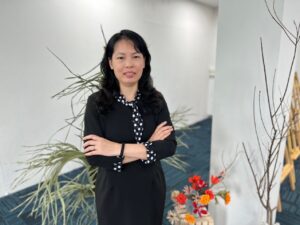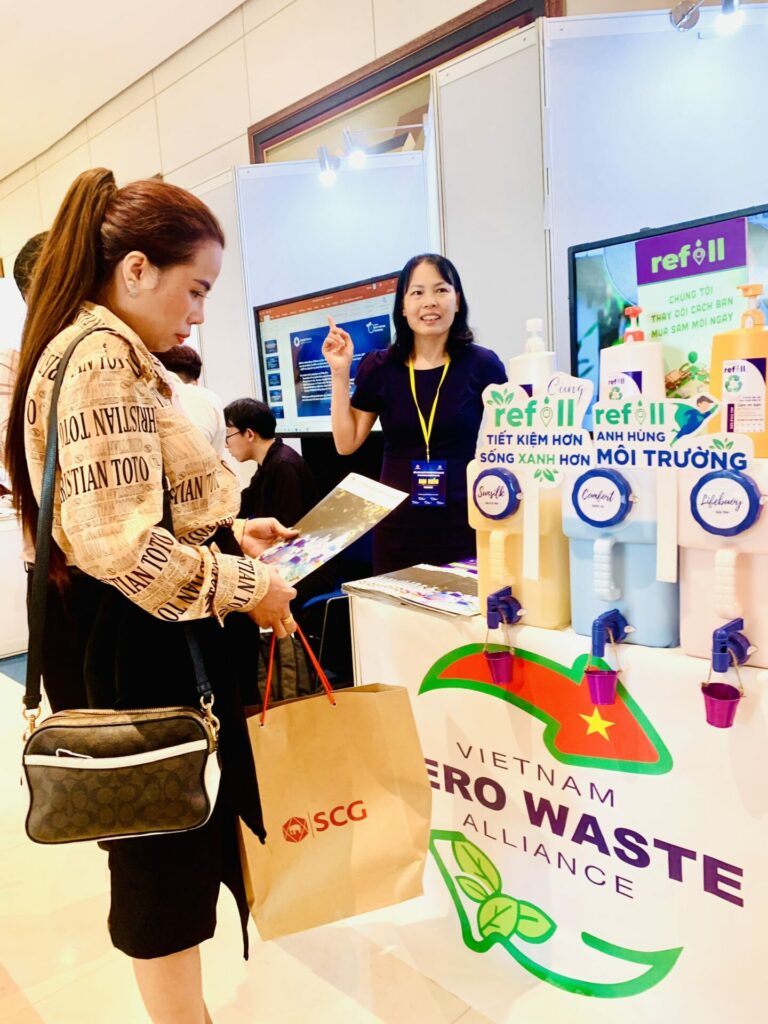Quách Thị Xuân: Organizing and Coordinating a Zero Waste Alliance
by Marlet Salazar

Quách Thị Xuân has always been involved in addressing environmental issues. Her passion for preserving and protecting the earth’s natural resources inspired her to devote her academic endeavors to gaining expertise in the field: she earned an undergraduate degree in Water Resources Economics, a master’s degree in Agricultural and Resources Economics, and a Ph.D. in Participatory and Integrated Water Resources Management.
She made sure to put her education to good use. From 1997 to 2012, she worked for the Institute of Water Resources Planning (IWRP) in Hanoi, and for the Danang Institute for Socio-Economic Development (DISED) from 2013 to 2019.
At IWRP, among other works, she conducted a study named ‘Valuing economic benefit from the improvement of water quality in Nhue Day River’ which focused on the water pollution problems and the importance of protecting and improving river water quality. At DISED, she and her colleagues helped direct the fund from Korean International Cooperation Agency (KOICA) to build a community park in An Hai Bac Commune, Son Tra District, and mobilized private resources to plant more trees and build more green spaces in the city.
The sight of her community in the countryside riddled with waste prompted Xuân to direct her attention to the massive plastic waste problem. In 2017, her resolve was strengthened when she attended a forum on Zero Waste where Froilan Grate, regional coordinator of GAIA Asia Pacific, was one of the speakers.
“Froilan is one of the two people who inspired me to pursue Zero Waste activism. The other is Nicole Portley of the Pacific Environment. I could see their passion in what they’re doing and that compelled me to bring that spirit into our Zero Waste initiatives in Vietnam.”
That same year, she started her work on Zero Waste. At the time, there were already individuals and small enterprises that were aiming to get more people to shift towards the Zero Waste lifestyle. One thing that Xuân noticed was that there was no network of non-government organizations (NGOs) working alongside the government to consolidate and strategize these different efforts to move the country towards Zero Waste.
Xuân stepped up to take a leading role and, with the support of like-minded individuals from other organizations, organized themselves and formed the Vietnam Zero Waste Alliance (VZWA).
“My role is to build VZWA to become a large network, bigger in terms of members and stronger in terms of influencing, inspiring, and convincing communities to apply Zero Waste practices. Day after day, we have been communicating, sharing best practices and achievements, incorporating new members, and supporting capacity building for our members. I also actively collaborate with our members to do collective actions, such as cooperating with Greenhub on building up a Zero Waste school movement, collaborating with Hoi An to implement the coffee cup reusing project, or coordinating with other stakeholders to have collective comments to draft legal regulations,” Xuân said.
As one of their major collective activities, the alliance conducted various waste assessment and brand audits (WABA) to get a better picture of the waste being generated by various communities. “The waste, especially the plastic waste database is very important. Scientific numbers help convince people easier. The WABA is a good method to apply. We learned more by applying it. Doing the WABA also helps increase the capacity of our members. We encouraged our members to do WABA to create a collective activity that produces a collective result in the form of a report and later a collective work on communication. By doing WABA together, we had an opportunity to strengthen our network and improve our network power,” she said.
When she began helping her country move towards Zero Waste, Xuân realized that it wasn’t an easy task. She saw that it was a challenge, even in her hometown in the countryside.
“I saw a lot of waste, plastic waste in particular, in the streets,” Xuân said. “And it was disheartening to be a witness of how the environment is deteriorating.”
Xuân relayed a story about Froilan. “He has a beautiful story,” she said. “He used to do clean-up drives to get rid of waste. But he realized that he needed something more sustainable to really keep waste off the streets. That is how he started to become an environmental activist.”
Through her interactions in the field and among her family, Xuân was reminded about the importance of educating people about waste.
“Even within my family circle, I saw inadequate information on the dangers of waste mismanagement to the environment,” she explained. “Most people don’t really care about it. They had no idea about sorting and waste management practices.”
Xuân is relentless in her pursuit of enabling people to adopt a Zero Waste approach. Her organization, Pacific Environment, has been involved in teaching people about waste segregation and composting organics.
“We are hoping that we will be able to implement Vietnam’s environmental under-laws and policy on waste management,” she said. “The under-laws and regulations of the circular economy and extended producer responsibility are still missing, so working efforts on those things are still needed.”
Xuân also underscored the need to further strengthen the regulation on single-use plastic, saying that her country’s roadmap “is not ambitious enough.”
“We would like Vietnam to have a comprehensive roadmap to ban single-use plastic as soon as possible,” she said. “We cannot wait until things get worse.”
Vietnam’s road to Zero Waste has been beset with skeptics. “In the beginning, not many people, including other NGOs, believed in Zero Waste. They said Zero Waste is impossible, as their understanding of Zero Waste is that waste generation is equal to ZERO. Many citizens just tossed their waste everywhere. But Zero Waste is a lifestyle that we need to practice every day,” she said.
She also admitted that VZWA needs more support in providing people with enough information to shift to a sustainable lifestyle. “We continuously do capacity building. We need to have a strong collective action to bolster waste management in our country,” she said.
She added: “We understood that the problem is time. It will take some time for all stakeholders to be on the same page. We accepted the fact that we need to be patient, we need to use the bottom-up approach and tried to pilot and show stakeholders a successful model of a Zero Waste community. We’ve done that. From the first MRF [materials recovery facility] in Tan Hiep commune of Hoi An City, now there are six more, and Hoi An City is mapping potential MRFs in its whole city and it will soon be ready to announce that it is the first Zero Waste City in Vietnam.”
At present, Vietnam is completing its legal framework to implement the law on extended producer responsibility and the circular economy, and preparing to join the Global treaty on Plastic Pollution. There have been hundreds of national and provincial consultation workshops to ensure stakeholders’ participation and buy-in.
Because of her role in VZWA, Xuân was invited to participate in the consultation workshop with businesses and the government, where she collaborated with various sectors to come up with regulations that would strictly enforce Zero Waste. She is most proud of the role she played in the drafting of the national Zero Waste rule.
Her hope is that the Zero Waste movement that VZWA is working on to mainstream in Vietnam would spark a significant wave of interest among the population.
“We now have a network with 25 organization members. Zero Waste communities, Zero Waste school models have been built in various parts of the country. Knowledge in differentiating right and wrong practices, in upstream and downstream solutions, are well communicated. If we keep doing this, we will achieve our vision that by 2030, most of Vietnamese people will understand, support, inspire, and apply Zero Waste practices. Of course, the ultimate goal is to successfully solve the plastic pollution problem,” she said.










